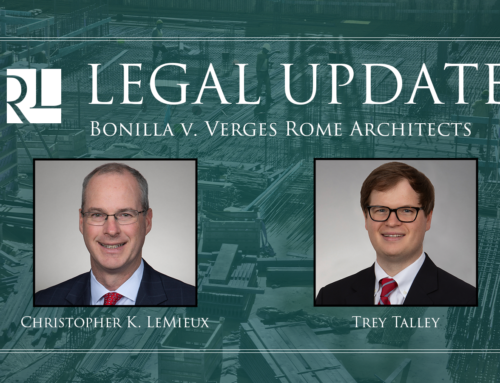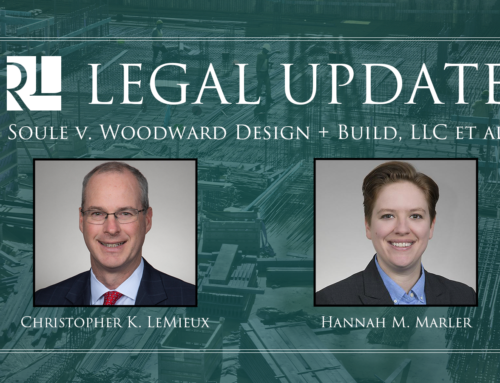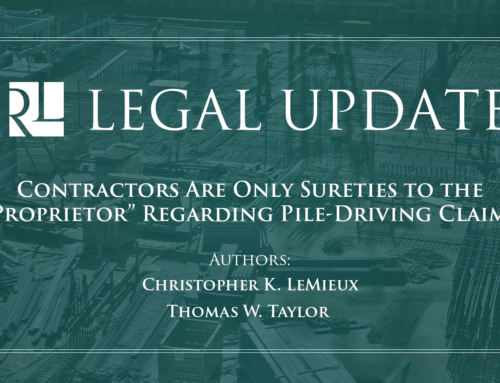Summary: DQSI v. APC Construction LLC
Louisiana Court of Appeal for the First Circuit recently highlighted the importance for general contractors to clearly and unambiguously place a subcontractor in default for purposes of enforcing a surety performance bond.
 Authors: Christopher LeMieux and Michael Levatino
Authors: Christopher LeMieux and Michael Levatino
In a recent decision, DQSI, LLC v. APC Construction LLC, 2021-1256 (La. App. 1 Cir. 7/29/22), 2022 WL 3009926, the Louisiana Court of Appeal for the First Circuit reviewed a motion for summary judgment which granted the dismissal of the general contractor’s claims under the performance bond and against the surety. The court granted the surety’s summary judgment motion due to the general contractor’s failure to comply with the requirements of the performance bond. A dispute arose on the project regarding the subcontractor’s performance.
In this case, the general contractor contracted with a subcontractor for the construction of a rock dike. As part of the subcontract, the subcontractor was required to obtain a performance bond. The performance bond specifically required that the general contractor had to place the subcontractor in default and demand the surety promptly remedy the default to enforce the performance bond. At issue in the case, is whether the general contractor placed the subcontractor in default and on notice of termination of the subcontract to satisfy the requirements of the performance bond.
At the District Court, the surety filed a motion for summary judgment alleging that the general contractor did not place the subcontractor in default and thus, the performance bond could not be enforced. The surety alleged that the general contractor accepted the rock dike and never placed the subcontractor in default or demanded the surety complete the work. The general contractor opposed the surety’s motion citing to multiple letters in which the general contractor notified the subcontractor and surety that the subcontractor’s work was not in compliance with the plans and specifications, but the general contractor stated it would “stand down” if the subcontractor provided a sufficient plan to remedy the alleged default. The evidence submitted proved the subcontractor provided a plan to remedy the non-compliant work. Subsequently, the general contractor sent an additional notice almost six months later stating that the subcontractor failed to complete punch list items after the work was complete. The District Court granted the surety’s motion for summary judgement finding that the general contractor did not place the subcontractor in default as required by the performance bond.
The general contractor appealed. The First Circuit upheld the trial court’s granting of the surety’s motion for summary judgment. The Court found that the general contractor did offer multiple complaints about the subcontractor’s timeliness and quality of performance, but the default was conditional. The court found the general contractor failed to unequivocally express to the subcontractor or surety it regarded the subcontractor unable or unwilling to perform and was relieved of its obligations under the subcontract. To the contrary, the Court found that although the general contractor desired to assert a performance bond claim, it also conditioned its claim on the subcontractor submitting a remedial work plan, which the subcontractor did submit.
Additionally, six months passed without any complaint from the general contractor before it asserted additional deficiencies. The Court noted that the general contractor’s complaints changed from the subcontractor’s noncompliance with the plans to, instead, failure to complete the punch-list items. The Court found that the nature of the alleged material breach changed and thus, does not support a finding that the general contractor sufficiently placed the subcontractor and surety on notice of default and notice to the surety to immediately commence performance under the terms of the bond. Therefore, the court upheld the granting of summary judgement in favor of the surety, which precluded the general contractor from recovering amounts paid to a third-party subcontractor to complete the punch-list items.
As indicated by DQSI, LLC v. APC Construciton, LLC, it is important for a general contractor to review the terms of a subcontractor’s performance bond and the requirements to unambiguously place the subcontractor in default to enforce the bond. Otherwise, a general contractor may be precluded from enforcing the performance bond and recovering cost associated with hiring third-party subcontractors to complete the defaulting subcontractor’s work.



